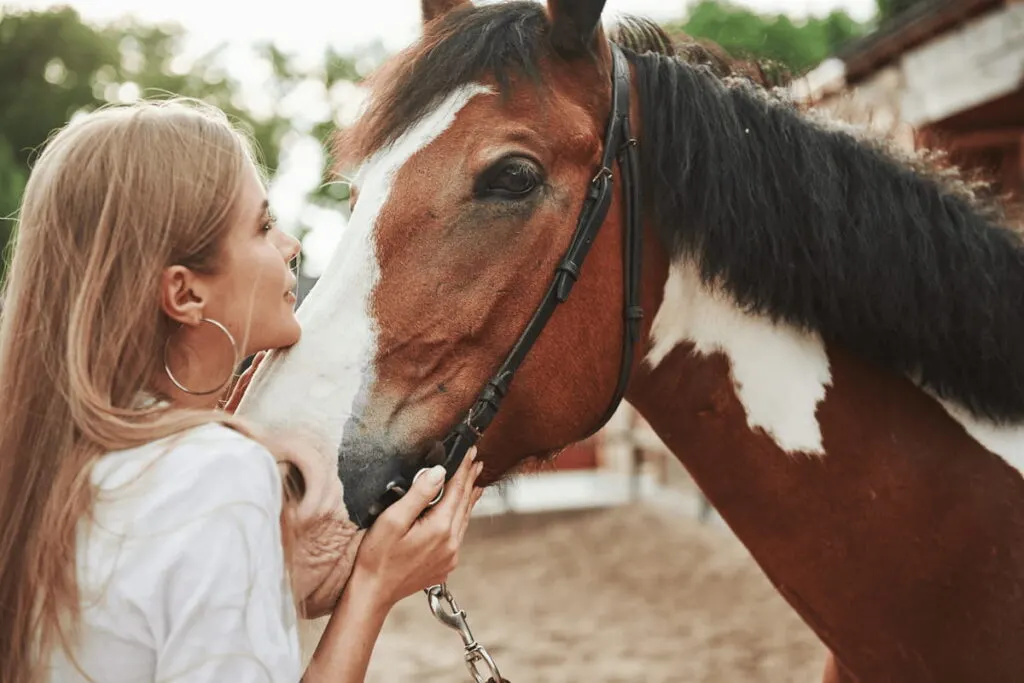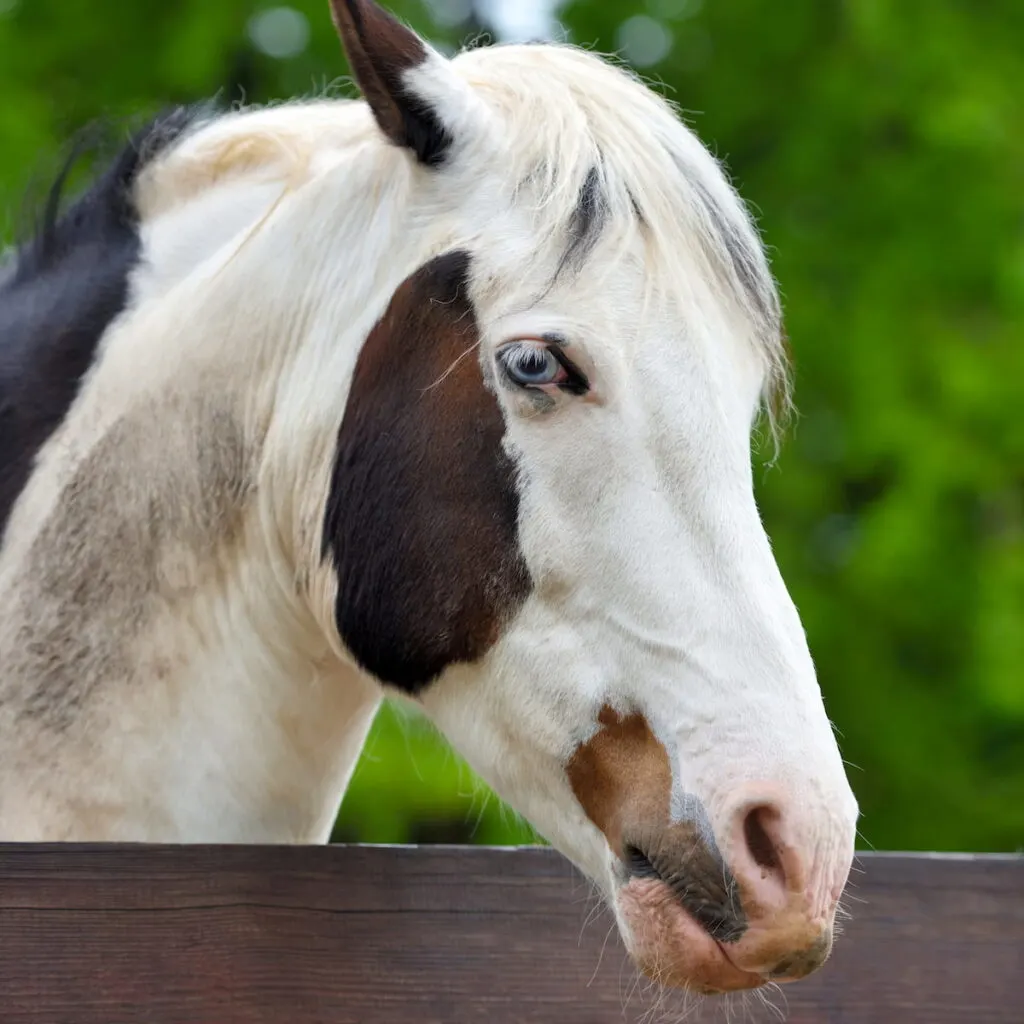Horses typically have large, solid-colored eyes with little to no white that can be seen. It can be quite alarming, however, when your horse has white eyes or more white in their eyes than you are used to seeing.
White eyes in horses just means that the white tissue of their eyes is showing, which is not typical in all horses but is not completely out of the ordinary in many horse breeds. A lot of horses have such large pupils that the white part of their eyes cannot be easily seen.
Here are 9 reasons why your horse has white eyes.
Table of Contents
Your Horse Naturally Has More White In Its Eyes.
A lot of horses naturally have more white showing in their eyes than other horses. Some horse breeds are just more likely to show a noticeable amount of white tissue in their eyes from birth.
Horse breeds like Appaloosas, American Paint Horses, and POAs (Pony of the Americas) tend to have eyes with more white showing in them than other horse breeds. If your horse is not one of these breeds but has always had a lot of white area showing that surrounds the eye, then you probably have nothing to worry about.
Your Horse Is Frightened.
Horses that are frightened will often appear to have white eyes because it is one of their natural reactions to fear.
The whites in their eyes will be much more visible when horses are on high alert, especially when they are afraid.
Just because your horse has white eyes does not necessarily mean they are frightened at that exact moment. Horses that are afraid will show other signs of fear including flared nostrils, a raised head, and rearing up.
Your Horse Is Energized.
A horse that is energized and excited will often show more white in its eyes as well. Horses that are excited about being fed, seeing their equine buddies in the pasture, or getting ready to compete in a sporting event will often have eyes that appear more white.
Energized horses also will have rising heart rates and will breathe more rapidly in anticipation of a forthcoming event. If your horse is about to do something they consider fun, showing the whites of their eyes is a display of their excitement.
Your Horse May Just Have Its Eyes Turned Too Far.
If you only notice that your horse only has white eyes occasionally, it may just be because their eyes are very focused in a specific direction. For instance, if your horse looks out of the far corner of their eye, it can just cause more of the white part of their eye to be seen.
The same is true if they look down at the ground or up to the sky without moving their head in the same direction. When their eyeball moves to whatever direction they are looking at, it allows us to see the whites of their eyes more clearly.

Your Horse Has Light-Colored Eyes.
Horses that have light-colored eyes often have more of the white in their eyes that shows through. Lighter eyes have less pigment which can make them appear to have more white area surrounding their eyes.
Just because a horse has light-colored eyes and more white showing in their eyes, that does not mean that anything is wrong with them. They may be more sensitive to bright light, but other than that, they are probably fine.
Your Horse Has an Elevated Third Eyelid.
Horses that have a noticeable amount of whitish material in their eyes could have an elevated third eyelid. This simply means that their third eyelid is swollen and producing a whitish-yellow discharge.
The eye and the skin surrounding it will appear swollen while the normally off-white or pink-colored third eyelid will probably be visible with whitish-colored discharge.
If you suspect your horse has an elevated third eyelid, contact a veterinarian as soon as possible for assistance.
Your Horse’s Eye Has Been Injured.
Sometimes, a white eye in a horse can indicate an eye injury. If you suddenly notice that your horse has a white eye and also has swelling, redness, white discharge, or white tissue coming out of it, there is a good chance it has been injured.
Horses are notorious for getting the oddest and most unforeseen injuries, especially in their eyes.
Eye injuries in horses should be seen by and treated by a veterinarian as soon as possible to prevent stress, possible blindness, and further injury to the eye.
Your Horse Could Have Cataracts.
If your horse develops eyes that look cloudy, milky, or glazed over in a white-colored film, it could be because of cataracts. Cataracts usually do not occur in horses until later in life and if they are especially severe, they can be corrected in many cases.
If you see white in the corners of or around the eye, that is not because of cataracts. The discoloration, or cloudiness, of cataracts will be over the colored part of the eye, where the lens is at.
Cataracts in horses can be genetic, trauma-related, or simply occur due to age. If you think that your horse has cataracts, consult a veterinarian for an official diagnosis and treatment options.
Your Horse Has An Eye Infection, Disease, Or Inflammation.
Horses that develop white eyes out of the blue may suffer from some kind of ocular infection, eye disease, or inflammation of the eye. If your horse has white areas in the colored part of the eye, or has white-colored discharge or tissue coming out of the eye, it is time to call a veterinarian.
Uveitis is a severe inflammation of the eye that can cause white cloudy spots on the eye lens and can lead to blindness.
Melting ulcers, conjunctivitis, viral ulcers, and stromal abscesses are just a few of the eye issues in horses that can cause parts of the eye to turn white or cloudy.

Are Horses With White Eyes Crazy?
While white eyes can be a sign of fear in some horses, it does not necessarily mean they are crazy. If your horse had always had white showing in its eyes, it is probably just genetic.
If a horse is crazy, so to speak, it will show a lot more signs than just showing the whites in its eyes. A crazy, wild acting horse will probably often display white eyes along with rearing up, kicking, and other explosive actions.
A horse just having white eyes does not equal craziness.
Are Horses With Lots of White In Their Eyes Always Appaloosa in Origin?
Appaloosas typically do have a lot of white in their eyes naturally, however, they are not the only horse breed that does. American Paint horses, some quarter horses, and horses of other breeds can naturally show a noticeable amount of white in their eyes.
Are Horses With White Eyes Blind?
Horses with white eyes are usually not blind, although some equine eye disorders that appear as white areas can lead to blindness if left untreated. The truth is many horses that are blind display little to no changes in their eyes.
Horse owners are often shocked to find out their horse is blind or somewhat blind in one or both of their eyes because the horse’s eyes did not change from their normal state.
Difference Between White Eyes Due to Sclera and White Eyes Due to Cataracts / Vision Impairment
The main difference between a horse having white eyes due to their natural sclera tissue and having white eyes due to cataracts and other vision impairments is the location of the white area.
If a horse simply has white areas showing in the corners, top, or bottom of their eyes, that is usually just their sclera tissue and it is completely normal.
If a horse has white or cloudy areas on the lens, the colored part of their eye, that is due to either cataracts or other significant vision disorders or impairments. White or yellow-tinged discharge is also a clear indication of a visual infection or inflammation.
How to Tell if Your Horse Can See Properly
There are a few ways you can test your horse’s vision on your own. If these do not work or if you are still unsure, consult a veterinarian for a professional vision check.
· Moving Hand Test
Test each eye by covering the other eye and moving your hand in front of the uncovered one. Do not let your hand get too close to its eye and watch to see if their eye follows your hand as you move it.
· Obstacle In Path Test
Try putting a small branch or a hose in the horse’s path and gently lead them over it. If they intentionally step over it, that will indicate they have good vision in at least one of their eyes, if not both.
· Light Test
Shine a safe form of light in their eye and see if they blink. A horse with good vision should do something, like blink or move its head, to escape the light.
Final Thoughts
Many new and even experienced horse owners can get a little worried when a horse has white eyes, especially if they have never seen it before. The good thing is that simply having white areas showing in the corners, bottom, and top of the eye is often completely normal.
The not-so-great news is that usually white discharge or white areas in the colored part of the eye signal a potentially dangerous eye issue that needs to be addressed. Luckily, you have learned how to spot the difference and when a call to your local vet is in order.
Resources:
Researching the reasons why a horse has white eyes was an educational adventure. Here are the sources that were used to write this article.
- https://thehorse.com/150973/why-can-i-see-the-whites-of-my-horses-eyes/
- https://ker.com/equinews/checking-horses-vision/
- https://news.vet.tufts.edu/2018/05/equine-clinical-case-challenge-swollen-third-eyelid/
- https://equimed.com/diseases-and-conditions/reference/cataracts
- https://thehorse.com/162495/dealing-with-deteriorating-vision-in-horses/
- https://www.chegg.com/flashcards/equine-ophthalmology
